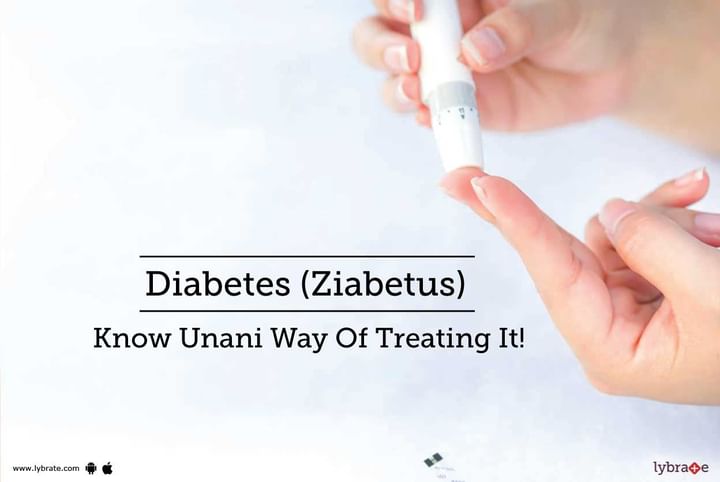Diabetes (Ziabetus) - Know Unani Way Of Treating It!
Diabetes (Ziabetus):
The word Diabetes comes from the Greek word “Diabanmo” which means to run through or passingthrough. It is characterized by excessive urination (Polyurea) excessive thirst (Polydypsea), increased appetite (polyphasia), presence of sugar in urine, gradualloss of body weight, etc.
In Unani medicine Ziabetus is the term which isused generally for diabetes, and Ziabetus Shakari for diabetes mellitus. Itis mentioned in most of the Unani literature like Al Qaanon, Al Hawi, KamilusSana’ah, etc. Arabian scholars have also mentioned it by terms like Atsha,Istisqa-e-Amnas, Mo’attisha, Dulaab, Dawwarah, Barkariyyah, Zalaqul kuliya, Ziyasqoos and Qaramees. Egyptians have described clinical features similar toDiabetes almost 3000 years back.
Unani Concept:
As per Unaniphilosophy, it is a disease in which the consumed water is passed out throughthe kidney immediately after its intake by an individual without any metabolicchange. Due to hot temperament of kidneys, the water is absorbed from the bloodcirculation and sent to the urinary bladder.
As per Unaniphilosophy of causation of disease, it is based on mizaji (temperamental) andsaakhti (structural) deviation. Any imbalance between mizaj (temperament) andsaakht (structure) results in disease.
Classification of Diabetes (Ziabetus):
According to the presence or absence of sugar in the urine, it is divided into two types:
1. Ziabetus Sada or Ziabetus ghair shakari (Diabetesinsipidus), characterized byexcessive thirst and urination, without the presence of sugar in the urine.
2. Ziabetus Shakari(Diabetes mellitus),characterized by excessive thirst and urination, but with sugar in the urine.
- According to the intensity (Khiffat wa Shiddat) of the disease, it is also divided into two types:
1. Ziabetus Haar: Abrupt onset with severity of symptoms.Such as excessive thirst (polydipsia) and increased urination (polyuria),increased appetite (Polyphasia), with the signs and symptom of other su-e-mizaj haar, such as heat in flanks and dryness of the body, due to su-e- mizajhaar sada (excess of heat) of kidneys.
2. Ziabetus Baarid: Gradual onset and less severity ofsymptoms comparatively. Such as thirst and frequency of urine are comparativelyless.
Causative Factors:
Unani physicians like Ali ibn-e-Abbas Majoosi, Ibn-e-Sina (980-1037AD) and Najeeb-ud- Deen Samarqandi (Died 1222AD) described some underline etiopathogenesis of thedisease in their classical texts. It was supposed that the disease is relatedto kidney. The important etiological factors mentioned in Unani System ofMedicine are the following:
- Zof’e Gurda (Weakness of kidney)
- Ḍu f al-Kulya (Renal insufficiency)
- Sue Mizaj Haar Gurda (Hot derangement in the temperament of kidney)
- Sue Mizaj Baarid Gurda (Cold derangement in temperament of kidney)
- Ittesae Gurda wa Majra-e- Baul (Dilatation of kidney and urinary tract)
- Baroodat-e- Badan, Jigar wa Gurda (Cold derangement in temperament of body, kidney and liver)
Management:
Uncontrolled diabetesmay lead to kidney disease, heart disease, blindness, gangrene and even coma.Modifications in diet and lifestyle can reduce the possibility andcomplications of the disease. Unani medicines are strongly advisable inlifestyle diseases, especially diabetes.
Fundamentals of treatment:
According to eminentUnani physicians, the drugs that correct the Mizaj of kidney and liver orrestore the retentive power (quwwat-e-masika) of kidneys are used to manage“Ziabetus haar.” So the line of treatment need to be adopted is as under:
- Correction of Su’-e- mizaj
- Removal of predisposing cause
1. Prevention
Prevention is betterthan cure and is applicable in case of diabetes as well. Regular exercise andproper sleeping habit help in prevention of lifestyle diseases speciallyDiabetes.
As per Unani concept,Diabetes mostly occur due to stress, anxiety, strain and tension(Infaalat-e-Nafsania), over-eating, Excessive use of Alcohol or SedentaryLifestyle. Persons with diabetes need to avoid sedentary lifestyle, stress/strain,anxiety and cold/humid environment etc.
2. Diet
Unani physiciansadvise balanced dietary plan, including fiber rich product and raw vegetables,to control and prevent the complications. Carbohydrate rich diet such as rice,potato, oily food, fruits and starch food items, should be side-lined in thediet of a diabetic patient. Reduce the total quantity of food as per dietchart. Avoid junk and sugary food. Restrict liquor and red meat. Avoid refinedcereals. Hot spices should be added in diabetic patient food (ghiza-e- mareez)e.g. Filfil Daraz (Piper longum),Zeera (Cuminum cyminum), Lehsun (Allium sativum) because they are Mulattif (Demulcent).
3. Ilaj bil Dawa (Pharmacotherapy)
Single and compoundformulations are mentioned below (which are free from side effectsand are holistic in nature).
Single Drugs:
- Kernel of Jamun seeds and its leaves
- Karela (bitter gourd)
- Tender shoots of Neem
- Fenugreek seed
- Gurmar Booti
- Basil leaves
- Satte gilo
- Cinnamon powder
- Elwa
- Kalonji
- Amla
Compound Drugs:
- Basant Kusumakar Ras 125 Mg twice a day
- Shreshthadi Avleh 10 gm twice a day
Note:
Along with medicine the patients have to follow strict regimen as per the concept of Unani system. The patients are therefore, strongly advised to avoid self-medication. They are advised to visit the nearest authorized Unani treatment centre for advice and treatment.



+1.svg)
